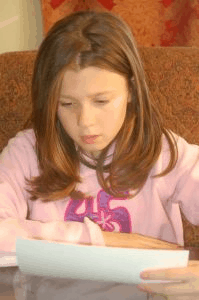By Cristin Trecroce
My daughter Lauren is the most beautiful vibrant happy little child you will ever meet. She laughs and smiles without provocation. Little things excite her. Her enthusiasm is one of her greatest gifts. Yet, it was unusual for this happy little child to come to me at the end of her second grade year crying to be home schooled.
Each day in the spring of last year, her school turmoil seemed progressive. She reported kids would say not nice things to her and teachers would concur. She insisted that she wasn’t stupid, but teachers and fellow classmates were making her feel that way. She said teachers would acknowledge kids in her class for knowing how to read and do math, and this made her feel invisible. She wanted to be class-favorite but instead she felt like class-neglected. She told me how much she wanted to learn but she couldn’t, and she didn’t know why. It all seemed emotionally exhausting and I couldn’t pinpoint a cause. I called her second grade teachers for a meeting.
Many words were said to me. I knew her teachers were glad I came to them, and they were eager to help me. Few words however now stand out in my mind. The words RED FLAG and LOST are etched in my memory. If I hadn’t called for that meeting I may have missed these words.
When Lauren was tested for the academically gifted program, she qualified. This is a school-wide test done in the fall of second grade. Unfortunately, Lauren’s numbers were only numbers to me. I didn’t know the discrepancy in her school performance versus her potential performance could signal a learning disability.
It wasn’t until this meeting that I learned that Lauren had dyslexia. For most of that year I was in the dark. Unfortunately during that time, her teachers described her look as “lost”. Of course that makes sense now: Lauren lost time, she suffered loss of self-esteem, and she lost part of her education.
Today Lauren is eight years old and in 3rd grade. However, there is much we do not know much about dyslexia. One out of every five of us has dyslexia, yet most of us who have it don’t even realize it. Lauren’s symptoms included her inability to focus, appearing as if she could not follow directions, difficulty with reading, and expressing written language. The key was when she adamantly refused to read aloud. She later admitted she “cheated” in all of her second grade reading assignments by looking at pictures.
Dyslexics have issues with symbol recognition. Written words are hard to recognize to them. It isn’t a sight disorder; they see fine. It is a brain disorder. Dyslexia is a condition they are born with or something that can occur to their brains. They have difficulty with reading and spelling, and these problems with language recognition and phonics affect many other areas of their education and their lives.
The good news is that it can be rehabilitated. Since adults and children with dyslexia learn differently, their brains develop new skills. They wind up being amazing “out of the box” thinkers and conceptualizers. They are often the most intelligent and creative people you will ever meet. They see the world in a different context from the rest of us. If they can be reached before their self-esteem takes a plunge and they are “lost”, we can all benefit from their unique qualities.
We continue with Lauren’s story each day, and I have been learning new things as her mom. Dyslexia is not my specialty, but my child is. Did you know there are as many dyslexics as there are diabetics in our society? That statistic alone helped me put things into perspective. There are so many resources in our community to help in my educational process, and below are three of my favorite links:
www.pbs.org/parents/readinglanguage/articles/dyslexia/main.html
www.dys-add.com/dyslexia.html
www.thebigpicturemovie.com
My purpose for raising awareness about dyslexia is to help those who do not have advocates like Lauren. Trust your instinct and your child. If you can, learn from my hindsight. Feel free to contact me to see if I can guide you to any additional resources. My email address is ctrecroce@yahoo.com.
Do you have a child with dyslexia? How did you discover this learning disability? How are you and your child working through this challenge? What other resources can you recommend to TMoM readers?
Cristin submitted this guest blog after reading our post here asking for guest bloggers. If you would like to guest blog for TMoM, please contact Katie at Katie@TriadMomsOnMain.com.
















